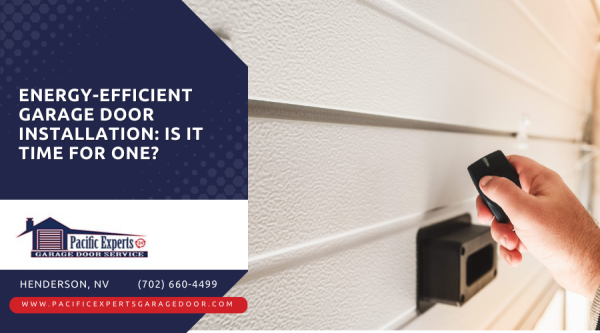Garage doors are a crucial aspect of your home's energy efficiency. They are one of the largest openings in your home, and if they are not properly insulated and sealed, they can be a major source of energy loss. This is where energy-efficient garage door installation comes in.

Introduction
Garage doors are an essential aspect of any home, providing a secure and convenient entryway for vehicles and storage. However, they also have a significant impact on your home's energy efficiency, particularly if they are not adequately insulated and sealed. An energy-efficient garage door installation can help to reduce energy costs, improve indoor air quality, and enhance your home's value.
Understanding Energy Efficiency
What is energy efficiency?
Energy efficiency refers to the practice of using less energy to perform the same function. It involves utilizing technologies and practices that reduce energy waste while maintaining or improving performance. Energy efficiency is a critical component of sustainability, as it helps to reduce greenhouse gas emissions and save resources.
Why is it important?
Improving energy efficiency can provide a range of benefits, including reduced energy costs, improved comfort, and reduced environmental impact. By reducing the amount of energy required to heat and cool your home, you can save money on your energy bills and reduce your carbon footprint.
What is an Energy-Efficient Garage Door?
An energy-efficient garage door is designed to reduce energy loss and improve insulation, helping to maintain a comfortable indoor temperature and reduce energy costs. These doors are typically constructed with insulated panels, weatherstripping, and thermal breaks to reduce heat transfer and air leakage.
Benefits of an Energy-Efficient Garage Door
- Energy savings
One of the most significant benefits of an energy-efficient garage door is reduced energy costs. By improving insulation and reducing air leakage, these doors can help to maintain a comfortable indoor temperature while reducing the workload on your heating and cooling systems. - Improved comfort and indoor air quality
An energy-efficient garage door can also improve indoor comfort by reducing drafts, minimizing outside noise, and improving indoor air quality. These doors help to maintain a consistent temperature and humidity level, reducing the risk of mold growth and other indoor air quality issues. - Reduced noise pollution
Garage doors can be a significant source of noise pollution, particularly if they are old and poorly insulated. An energy-efficient garage door can help to reduce noise pollution by minimizing vibrations and dampening sound. - Increased home value
An energy-efficient garage door can also increase your home's value, providing a significant return on investment. Energy-efficient upgrades are highly valued by homebuyers and can help to differentiate your home from others on the market.
Factors to Consider Before Installing an Energy-Efficient Garage Door
Before making the decision to install an energy-efficient garage door, there are several factors to consider.
Garage location and orientation
The location and orientation of your garage can impact its energy efficiency. If your garage is located on the north or west side of your home, it may be more exposed to the elements and require additional insulation. Similarly, if your garage is attached to your home, it may share a wall with a living space and require higher levels of insulation to prevent heat transfer.
Climate and weather conditions
The climate and weather conditions in your area can also impact the energy efficiency of your garage door. If you live in a region with extreme temperatures, such as hot summers or cold winters, an energy-efficient garage door can help to maintain a comfortable indoor temperature and reduce energy costs.
Existing garage door condition
If your garage door is old and in poor condition, it may be more cost-effective to replace it with an energy-efficient model rather than repairing it. Additionally, if your garage door is not properly insulated or sealed, it may be allowing significant energy loss and reducing your home's energy efficiency.
Budget
The cost of an energy-efficient garage door can vary depending on the type and level of insulation, as well as the size and material. Before making the decision to install an energy-efficient garage door, it's essential to consider your budget and determine the best option for your home.

Types of Energy-Efficient Garage Doors
There are several types of energy-efficient garage doors to choose from, each with its unique features and benefits.
- Insulated garage doors
Insulated garage doors are constructed with multiple layers of insulation, typically consisting of a steel or aluminum frame filled with foam insulation. These doors can significantly reduce energy loss and improve insulation, providing energy savings and improved indoor comfort. - Energy-efficient materials
Some garage doors are designed with energy-efficient materials, such as fiberglass, vinyl, or wood composites. These materials are lightweight, durable, and offer excellent insulation, reducing heat transfer and air leakage. - Smart garage doors
Smart garage doors are designed with advanced technology, such as smartphone connectivity, automatic openers, and energy-efficient features. These doors can be controlled remotely, provide real-time energy monitoring, and offer enhanced security features.
DIY vs. Professional Installation
While some homeowners may choose to install an energy-efficient garage door themselves, it's essential to consider the potential risks and benefits of professional installation. Professional installers can ensure that your garage door is installed correctly, providing the highest level of insulation and reducing the risk of energy loss and damage.
Maintenance and Care for Energy-Efficient Garage Doors
To ensure the long-term energy efficiency and performance of your garage door, it's essential to perform regular maintenance and care. This may include cleaning and lubricating the door components, inspecting for damage or wear, and ensuring that the door is properly balanced and aligned.
Conclusion
An energy-efficient garage door can provide significant benefits for your home, including energy savings, improved comfort, and increased home value. By considering the factors outlined in this article, you can determine whether an energy-efficient garage door installation is the right choice for your home.




